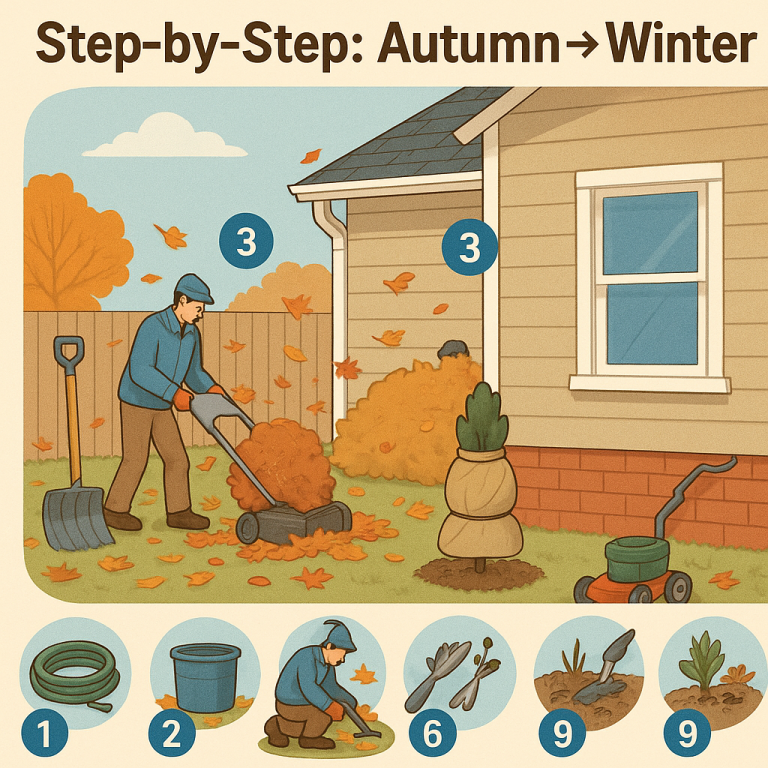As the last colourful leaves fall and frosty mornings return, it is time to begin your winter preparation. In Kingston and across Eastern Ontario, the weeks following Thanksgiving are ideal for tackling the tasks that protect your home before the first heavy snowfall. By sealing drafts, servicing your heating system, and preparing the exterior, you can reduce energy costs, avoid damage, and enjoy peace of mind all season long.

This guide explains everything from draining hoses and wrapping trees to sealing windows, checking furnaces, and preparing snow gear. By following this winter preparation checklist, you can head into the cold months with confidence, comfort, and security.
Exterior Winter Preparation: Protecting Your Home Before the First Snow
One of the most important parts of winter preparation is making sure the outside of your home can handle what is coming. In Kingston and across Eastern Ontario, heavy snow, ice, and wind can be especially hard on roofs, eaves, and outdoor systems. By taking care of these tasks now, you keep water out, reduce repair costs, and create a strong first line of defence against the cold.
Outside Checklist for Winter Preparation in Ontario
1) Drain & store hoses
Close interior shut-offs to exterior taps, then open outdoor spigots to drain. Add insulated tap covers for protection. Blow out in-ground irrigation systems if you have them as part of your winter preparation.
2) Empty rain barrels & disconnect downspout diverters
Drain barrels and store them upside-down to prevent cracking. Reattach downspouts so water discharges at least 1–2 metres from your foundation.
3) Clean gutters & downspouts
Remove leaves and debris, flush with a hose, and confirm good water flow. Add extensions or splash blocks to move water safely away from the home.
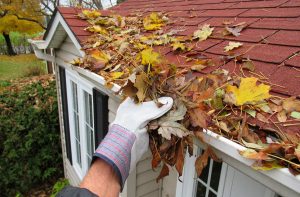
4) Check roof from the ground
Look for lifted or missing shingles, cracked flashing, and gaps around vents. If you have access to a drone that would be very helpful to you. Book repairs before the snow makes access difficult.
5) Prevent ice dams
Clear soffit vents and ensure attic baffles are not blocked. If ice dams were a problem last year, add insulation and improve attic ventilation.
6) Inspect foundation & grading
Seal small cracks with exterior-grade sealant. Ensure soil slopes away from the foundation and re-establish drainage swales if needed.
7) Tidy decks, patios & sheds
Wash surfaces to remove debris, store cushions and furniture, cover grills, and shut off gas to outdoor kitchens if not in use.
8) Lawn winterization
Give the grass a final mow slightly shorter than summer height. Mulch or bag leaves, apply a fall fertilizer, and overseed bare patches if conditions allow.
9) Mulch perennials
Apply 5–8 cm of mulch around perennials to protect roots from freeze–thaw cycles.
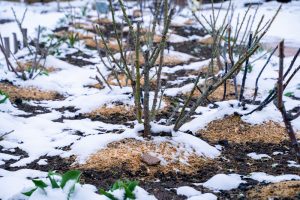
10) Wrap young, thin-barked, or delicate trees
Use burlap or commercial wraps to protect trunks from sun scald, wind damage, and salt spray.
11) Stake new plantings
Provide support for recently planted trees and shrubs so heavy snow and wind do not cause damage.
12) Garden & tools
Pull annuals, cut back diseased material, clean and oil garden tools, and store fuel safely for spring.
13) Pests & critter-proofing
Seal gaps larger than 6 mm with steel wool and caulk. Install door sweeps and check garage weather-stripping to keep rodents out.
14) Prepare snow gear
Service the snowblower, add fuel stabilizer, change oil, and stock shear pins. Place shovels and ice-melt near entrances. Mark driveways and paths with stakes.

15) Exterior lighting & safety
Test outdoor lights, replace bulbs, and ensure house numbers are well lit and visible for emergency responders.
16) Close your pool (if applicable)
Lower the water level, add winterizing chemicals, drain and blow out plumbing lines, and cover securely. Remove ladders, pumps, and accessories for storage.
Water, Well and Septic Preparation
17) Well & heat trace
Check that the well cap is sealed tightly. If you use heat trace cables, turn them on and verify they are working.
18) Septic system
If your system is due for pumping, schedule it before the ground freezes. Mark tank lids and leaching beds with stakes and avoid piling snow over them.
Windows and Doors Winter Preparation
19) Replace weather-stripping & caulk gaps
Swap out brittle weather-stripping around doors, windows and garage doors. Recaulk frames, trim, and penetrations where gaps appear.
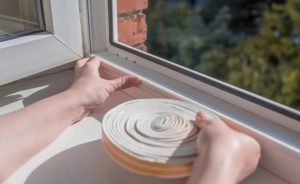
20) Add storm windows, window film, or thermal curtains
Install storm windows, apply insulating film, or hang thermal curtains to improve comfort and reduce drafts.
21) Adjust doors & thresholds
Replace worn door sweeps and adjust thresholds to reduce air leaks. These small tasks are a valuable part of winter preparation.
Mechanical Systems to Check Before Winter
22) Service the heating system (furnace or boiler)
Book a tune-up with a qualified technician. Replace filters and clean HRV or ERV cores and filters for better efficiency.
23) Test thermostat & clear vents
Check that your thermostat responds properly and set a reliable heating schedule for winter. Vacuum vents and make sure baseboards or radiators are unobstructed. If you do not already have one, consider installing a programmable or smart thermostat. It helps balance comfort with energy savings during Ontario’s fluctuating winter temperatures.
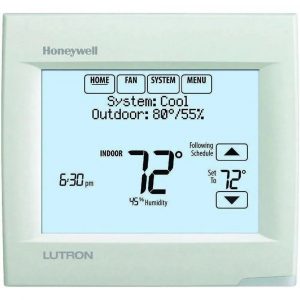
24) Sweep chimney & stock seasoned wood
Have chimneys and wood stoves inspected and cleaned. Order seasoned wood and store it off the ground in a dry location.
25) Set winter humidity & clean humidifier
Keep humidity around 35–45 percent to balance comfort and condensation control. Clean tanks and replace pads or filters.
Plumbing and Freeze Protection
26) Insulate vulnerable pipes
Wrap pipes in unheated areas such as garages or crawlspaces. Add insulated covers to outdoor taps.
27) Test the main water shut-off
Turn the valve to ensure it moves freely. Make sure everyone in the household knows its location.
28) Test sump pump & backup
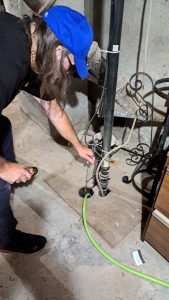
Pour water into the sump pit to confirm the pump activates. Check the discharge line for blockages and test the battery backup if installed.
Attic, Basement and Insulation
29) Air-seal attic hatch & penetrations
Seal around plumbing stacks, recessed lights, and attic hatches to cut heat loss.
30) Add insulation where thin
Top up attic insulation where coverage is compressed or uneven.
31) Seal basement rim joists & penetrations
Use caulk or spray foam at rim joists, sill plates, and utility penetrations to reduce drafts.
Safety Checks for Ontario Autumn to Winter Home Preparation
32) Test smoke & CO detectors
Replace batteries and check expiry dates. Install detectors outside bedrooms and on each level.

33) Check fire extinguishers
Confirm gauges read full and replace expired units. Keep one extinguisher in the kitchen, garage, and on each floor.
34) Refresh emergency & car kits
Ensure 72-hour kits have water, food, medications, flashlights, blankets, and radios. For vehicles, add a shovel, traction aids, and an emergency blanket.
First Snow Day Habits
35) Clear furnace/dryer vents & gas meter
After storms, remove snow and ice buildup around exterior vents and gas meters.
36) Manage snow placement
Shovel snow away from foundations, window wells, and entryways.
37) Keep exits and walkways clear
Maintain safe paths for daily use and in case of emergencies.
38) Watch for recurring ice on eaves or steps
Repeated icing can signal attic heat leaks or drainage problems that should be addressed when weather permits.
FAQs on Winter Preparation
When should I start winter preparation in Ontario?
Right after Thanksgiving is ideal, when most leaves are down but before the first hard freeze.
Do I need to wrap all my trees as part of winter preparation?
Only wrap young, thin-barked, or delicate trees. Mature trees are usually hardy enough, though they still benefit from a good mulch.
Is furnace servicing really necessary every year?
Yes. A yearly check improves efficiency, reduces breakdowns, and helps extend the life of your system.
What about rural and waterfront properties?
Check well caps, heat trace, and septic systems. If you own waterfront property, secure docks and remove water lines before freeze-up.
How can winter preparation help lower energy costs?
By sealing drafts, upgrading insulation, and servicing heating systems, you can reduce wasted energy and save on winter heating bills.
Don’t Miss These Guides
Looking for more practical homeowner advice? Explore these related posts:
Further Reading
For more official resources on energy and home maintenance, check out:



